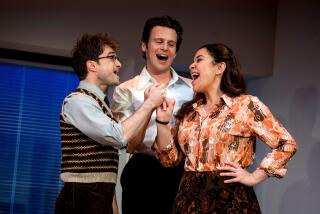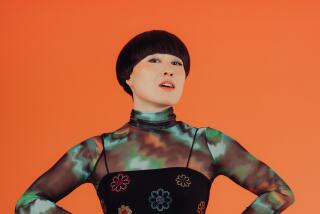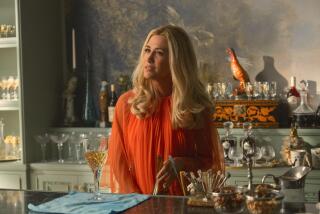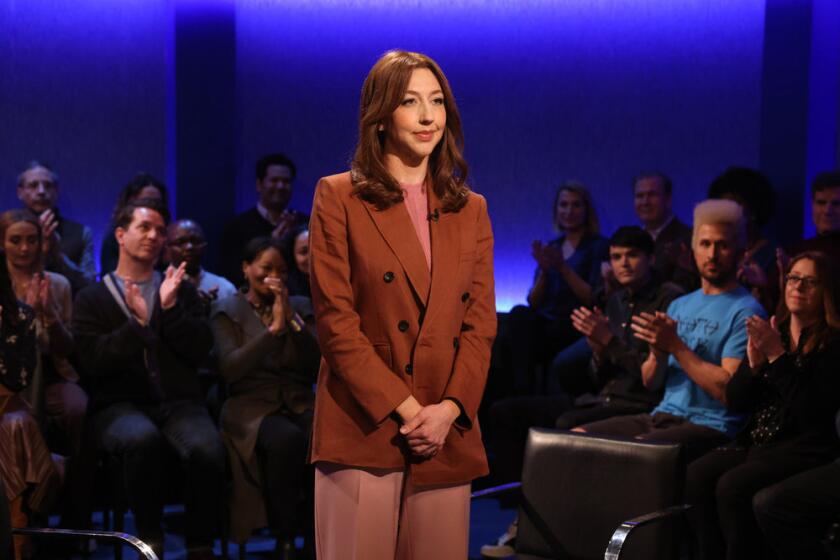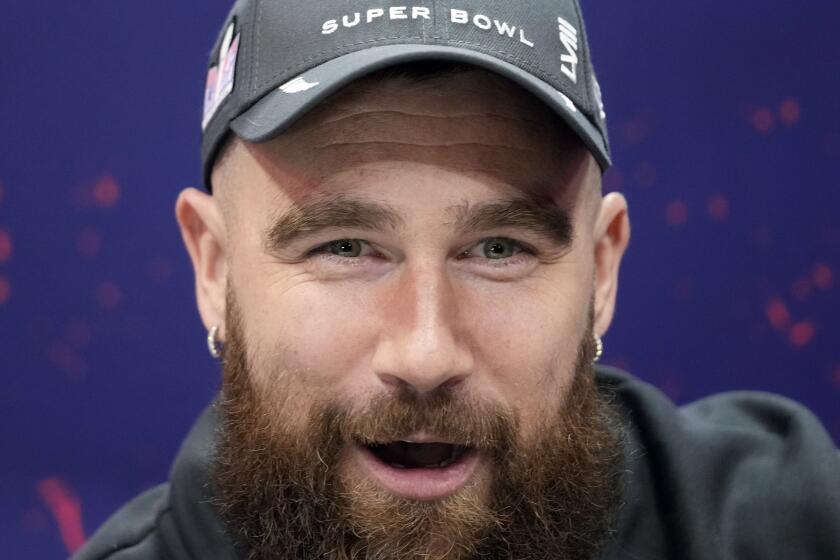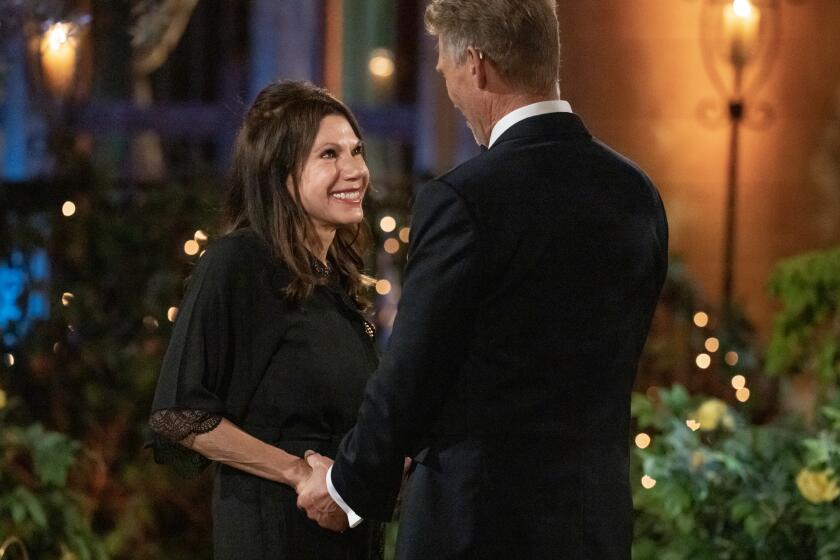Review: The fresh ‘The Characters’ and the stale ‘Flaked’ have Netflix in common and little else
Netflix delivered two new comedies Friday occupying opposite ends of the fresh/frozen aisle. “The Characters” is a revolving-star sketch series offering a “Portlandia”-like showcase to rising comedians, a concept with mixed but consistently interesting results; “Flaked” stars Will Arnett as yet another white middle-aged man-child paralyzed by the ordinary demands of adult life, this time in Venice.
Isn’t it time we called a moratorium on the whole man-child thing, which is an insult to both men and children?
See more of Entertainment’s top stories on Facebook >>
Like its recently released cousin “Love,” “Flaked” uses a Lonely Planet-guide ethos — the city of Angels has many vibrant neighborhoods! — to disguise a maddeningly familiar story line. But where “Love” is enlivened by the charm of its female leads, “Flaked,” created by Arnett and Mark Chappell, is just another exasperating exploration of stunted white male adulthood.
In this case, it’s Chip (Arnett), a charm-boy who takes advantage of every person he meets and occasionally feels bad about it. Not enough to change, of course, but enough that he regularly turns to the other characters, and the audience, for reassurance that he is still, basically, a good person.
Um, no.

No to the concept, no to the character and no to the whole “pity me, I am a grown man oppressed by my own bad choices and the vagaries of life” whine. Obviously Arnett is attempting to extend his portfolio to pathos — “Flaked” is low on humor even by today’s elastic definition of comedy — but the series, like the character, is blinded by self-indulgence.
We meet Chip as he is sharing in an Alcoholics Anonymous meeting about how, while driving drunk, he killed a man. This is, one supposes, the writers’ way of explaining Chip’s inability to function even half as well as a fifth-grader. But even though Arnett has toned down his signature sardonic slickness for the role, Chip speaks with a self-absorbed insouciance that makes him difficult to believe and impossible to like. It seems quite likely that he is making up this horrible story to impress his listeners, to whom he is, apparently, some sort of guru. (For purposes of this story, the Venice recovery community has no actual wise and reality-checking “old-timers.”)
Whether Chip is lying to himself or his fellow alcoholics doesn’t matter much as “Flaked” moves with self-conscious alacrity to his real concerns: Biking around Venice to con free stuff from friends, acquaintances and lovers.
It is, indeed, a tough life for Chip. A failed furniture designer, he is able to run what is apparently the last store on Abbot Kinney that does not have to make money to remain open while living, rent-free, in a house provided by his sweet and cartoonishly insecure friend/lackey, Dennis (David Sullivan).
In an opening conversation that immediately defines their relationship, and the show, Dennis (who is also pushing 40) describes London (Ruth Kearney), a waitress he has just fallen for, warning Chip not to “swoop in” as he always does. Chip is, in fact, dating Dennis’ last crush, a young woman named Kara (Lina Esco), whom he treats with reprehensible disrespect (but that’s OK, because, you know, he feels really bad about himself every time he does it).
London is a little lost herself, and through an excruciating machinations of plot, she becomes part of their lives. This means that while Chip and Dennis continue to discuss her as if she were the last mocha-cream cupcake at Sprinkles — you can have her; no, no you can — poor London is forced to stand by, gazing with growing and utterly nonsensical adoration at Chip. (Who, because this is a work of fiction, is catnip to all women.)

It also means that Chip may, finally, attempt to live his life a little less selfishly, but honestly, who cares? There are a million stories in the naked city, and this is one we do not need to see again. London, Venice, Netflix subscribers — you all deserve better.
Fortunately, “The Characters” is better, albeit in a now-for-something-completely-different way. Eight young comedians were given a little over a half-hour in which to produce … comedy. Which, in the four made available for screening, they do, moving through a host of characters in ways that sometimes work, sometimes don’t but are all fueled by an attempt to do something new.
Kate Berlant mocks the art world in a long set that features herself in a variety of roles, as well as cameos by real artists including Frank Gehry (who is hilarious). John Early puts a variety of characters through excruciating experiences (including the worst rehearsal dinner speech ever), Lauren Lapkus takes on reality dating competitions and Natasha Rothwell goes full-on variety show.
Offering situations as varied as a homeless man spoiling plots on a subway to a soon-to-be-viral rap about the glories of being “basic,” Rothwell’s episode plays like a modern-day version of “The Carol Burnett Show,” which, along with the rest of “The Characters,” reminds us of the hole it and other variety shows left behind.
It’s also a admirable swerve for Netflix. “The Characters” is not built for binge-watching; going from one artist to another requires a shift in tone and expectation that can be jarring and counterproductive. But having multiple episodes available is nice all the same. “The Characters” is not just entertaining, it’s inspiring, a welcome reminder that comedy, and television, is a work in progress. Better to swing big and miss sometimes than stay hunched defensively in a position that leaves you more of a target than a player.
More to Read
The complete guide to home viewing
Get Screen Gab for everything about the TV shows and streaming movies everyone’s talking about.
You may occasionally receive promotional content from the Los Angeles Times.
